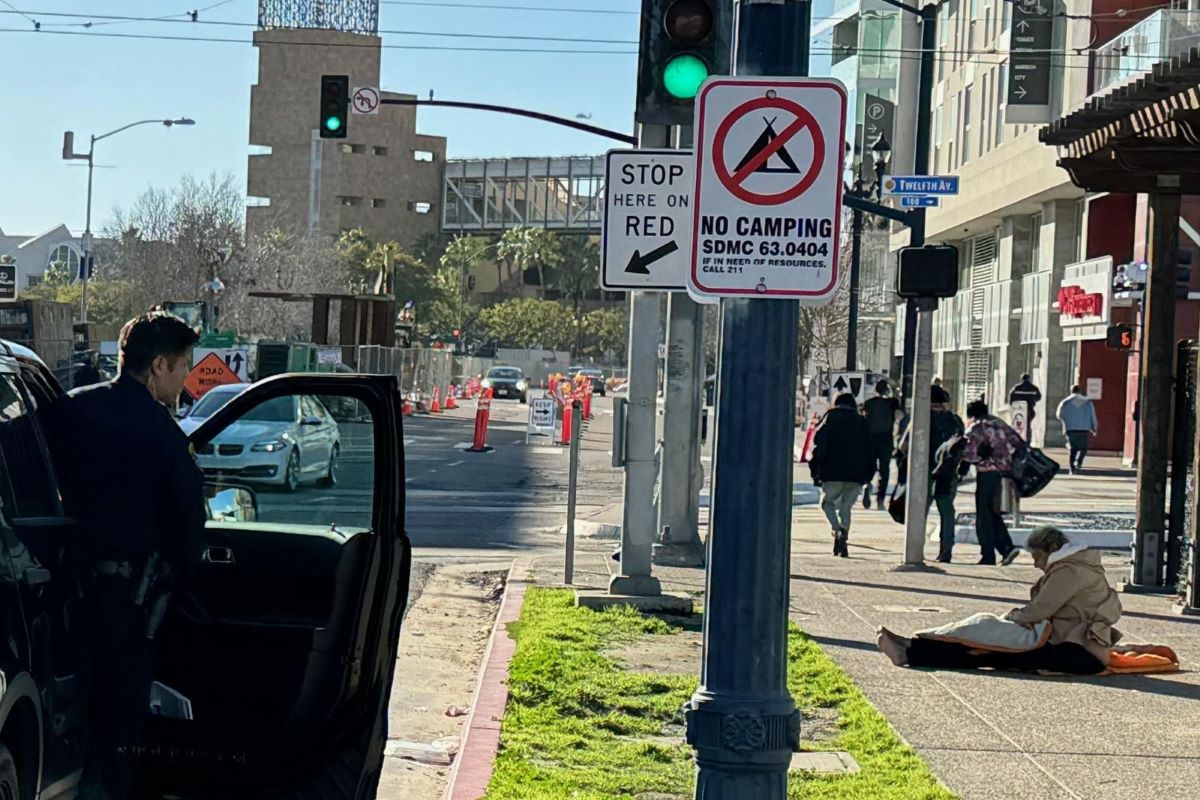Making It Illegal for Homeless People to Publicly Engage in Life-Sustaining Activities Puts Many Lives in Jeopardy, Including the Lives of Law Enforcement Officers
“Police aren’t equipped and aren’t given the proper training in order to actually help people experiencing homelessness unless they are the victims of a crime.”
– Legal Director Eric Tars explaining the perilous position of police officers conducting sweeps
Arresting Homeless People for Existing is Not a Solution to the Crisis
As election time rolls around again, political promises are in the air. One of the most talked about topics is the ever-burgeoning homeless crisis. Representatives on both sides of the political divide have vowed to “clean up the streets” and swiftly eradicate the homelessness issue. But what does that really mean?
In the decades leading up to this year’s election, the face of homelessness has certainly shifted. It has gotten much younger with the rise of family homelessness and also much older as seniors struggle to make ends meet on their measly social security wages.
It has gotten more desperate and also more visible. But, perhaps the most evident change of all is that the face of homelessness is being unjustly tied to criminality.
From a moral standpoint, homeless people are not criminals. They are not stealing, transgressing, or committing violent acts. But under the current legislation, being homeless is, indeed, a crime, and this is a huge problem.
All across our nation of wealth and luxury, laws that criminalize poor people for becoming homeless have increased to the point where it is nearly impossible for these individuals and families to even survive without facing the ever-looming threat of a pending arrest.
“We cannot arrest or ticket our way out of homelessness,” claimed Legal Director Eric Tars and his colleagues at the National Homelessness Law Center.
According to these experts, attempting to do so makes communities less safe and puts homeless people and police officials in a compromising position. We recently sat down with Eric Tars to find out more about how homeless criminalization hinders police teams by taking their attention away from violent crimes and placing them in conditions they are not equipped or trained to handle.
Criminalizing Homelessness Doesn’t Serve or Protect Anyone, Not Even the Police
As it turns out, sweeping homeless encampments doesn’t just endanger the lives of unsheltered residents. It also takes officers away from their true task of fighting actual crime, and often to the detriment of these law enforcement officials, many of whom are pretty disgruntled about it.
“Our Housing Not Handcuffs campaign has been endorsed by more than a dozen current and former law enforcement officers, ranging from former Attorney General Eric Holder to other, lesser-known line officers and detectives,” Eric explained.
“Simply put, police should not be our first line of defense when dealing with homelessness. Police aren’t equipped and aren’t given the proper training in order to actually help people experiencing homelessness unless they are the victims of a crime.”
“Using police officers to deal with homeless people as a default in the absence of practical solutions that will solve people’s underlying homelessness is setting both police and people experiencing homelessness up for the next potential viral video,” he continued. “It’s a volatile situation where these law enforcement officers are being used as pawns to disturb these unsheltered residents by telling them have to leave their very means of survival, their tent or their sleeping bag, or the blanket that’s keeping them warm, under the threat of arrest.”
“In most cases, the officer who is doing this doesn’t have the tools to connect that homeless person to the thing they need, which is housing. The only thing that the officer has is a gun on their hip or a citation booklet in their hand. These things only present more barriers to getting into housing.”
“Imagine the threat that person experiencing homelessness is going to feel when they are approached in this manner,” Eric said. “They probably haven’t gotten a decent night’s sleep in a long time, and they are likely to be in a state of heightened stress. They may have other co-occurring mental health issues. This is setting that police officer up for a dangerous situation.”
De-escalation and Wraparound Services Are Vital Tools for Solving Homelessness. Police Officers Possess Neither.
“Police officers aren’t given excellent training in de-escalation,” Eric went on. “Unlike behavioral health therapists and social workers, police officers are not versed in nonviolent crisis aversion techniques for the most part. This is why it’s harmful to the line officers.”
“Homeless criminalization also threatens these law enforcement officials’ mental health,” he said. “Most of them don’t want to be enforcing laws like this. It doesn’t make them feel good about themselves to punish people who are already suffering. It lends to their burnout and feeling like they aren’t doing the job that they want to be doing. It redirects their energy and attention away from violent crime. Ultimately, criminalizing homelessness makes the streets less safe for everyone in the community.”
Tell Your Representatives to Draft Laws That Protect Our Police by Making Housing a Human Right
There are currently pieces of template legislation on the table that would make it a crime for police officers not to enforce anti-homeless laws and ordinances. Forcing police to forcibly relocate our unhoused neighbors from street corners to prison cells to mental institutions and destroying their property along the way is of no use to anyone. Let’s avoid the next violent viral video by eliminating homelessness and making housing a human right.













